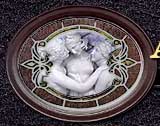Response: Sylvia Plath's "Mirror"
1 I am silver and exact. I have no preconceptions.
2 Whatever I see, I swallow immediately
3 Just as it is, unmisted by love or dislike
4 I am not cruel, only truthful -
5 The eye of a little god, four-cornered.
6 Most of the time I meditate on the opposite wall.
7 It is pink, with speckles. I have looked at it so long
8 I think it is a part of my heart. But it flickers.
9 Faces and darkness separate us over and over.
10 Now I am a lake. A woman bends over me.
11 Searching my reaches for what she really is.
12 Then she turns to those liars, the candles or the moon.
13 I see her back, and reflect it faithfully
14 She rewards me with tears and an agitation of hands.
15 I am important to her. She comes and goes.
16 Each morning it is her face that replaces the darkness.
17 In me she has drowned a young girl, and in me an old woman
18 Rises toward her day after day, like a terrible fish.
I wondered initially why Sylvia Plath chose to wrote from the point of view of the mirror, but
decided it makes a sort of sense. It is readily apparent that impending age frightens and repels
her, but the mirror can describe this in crisp, shiny words; its neutrality has greater impact
than the gushing of one's personal fears.
Further study revealed that this was an unsteady, bitter time in Plath's life. Her husband had
already left her, and it was one of the last poems she wrote before she quietly committed suicide.
The mirror, then, takes on more identity than a mere observer. It reflects a theme of
insignificance, of dependence, and of false reliance on appearance. Must women, after all,
depend upon their appearance? From this poem it seems that Plath thinks so, for the mirror's
truthful response might have laid plain the reason for her man's departure. Its honesty is more
brutal than coaxed praise and faint suggestion; the Moon and candles are liars because they shed
only soft light, hiding the blemishes and the oncoming shadow of one's age. They are objects of
love and romance while the mirror is an object of daily routine; days and years of alternating
image and darkness do not change its function or its intent. The Moon and candles are now reviled
because their realm--love and mystery--has been abandoned. The mirror remains, faithful and
placid.
I felt that the mirror seems to take on the plight of all humans, in assuming the classic
identity of the lake, which has been the mirror of humankind since humans began to be self-aware
and to regard youthful appearance as a factor in the choice of mates. Despite their similar task,
the differences between the two are large: the flat, clinical honesty of a mirror as opposed to
the distortion and unknown depth of water. Water ripples and moves, and contains things within.
It has purpose of its own. One can break its surface and enter it. One can look down into water
from above, perhaps to retain a sense of importance, but must look straight on into the mirror.
Yet they are cousins who tell the same inevitable story to the author. Additionally, the metaphor
of the lake brings Plath's handwringing distress into sharper relief; her childhood has long
since drowned, perhaps to little use, and she sees now only the "terrible old fish" of aged
spinsterhood.
David Elsensohn, September 2005
Return to Essays
|

